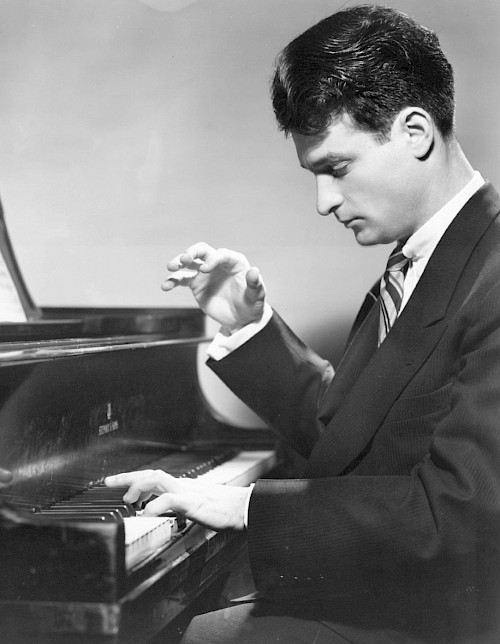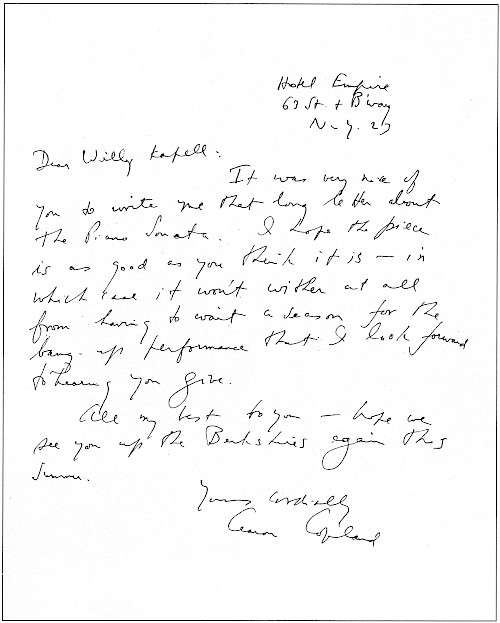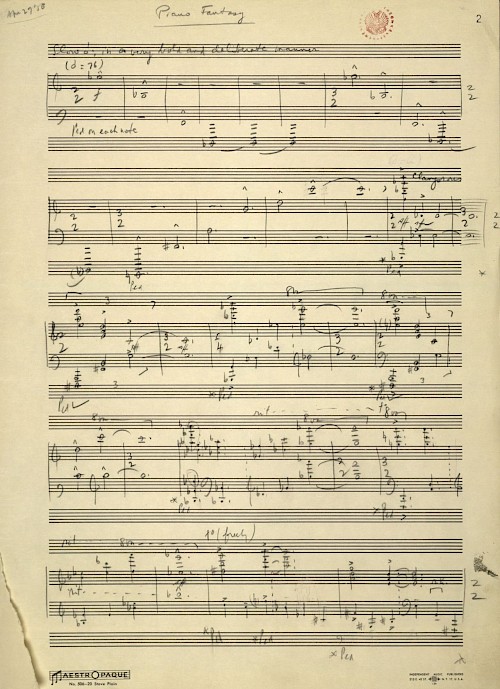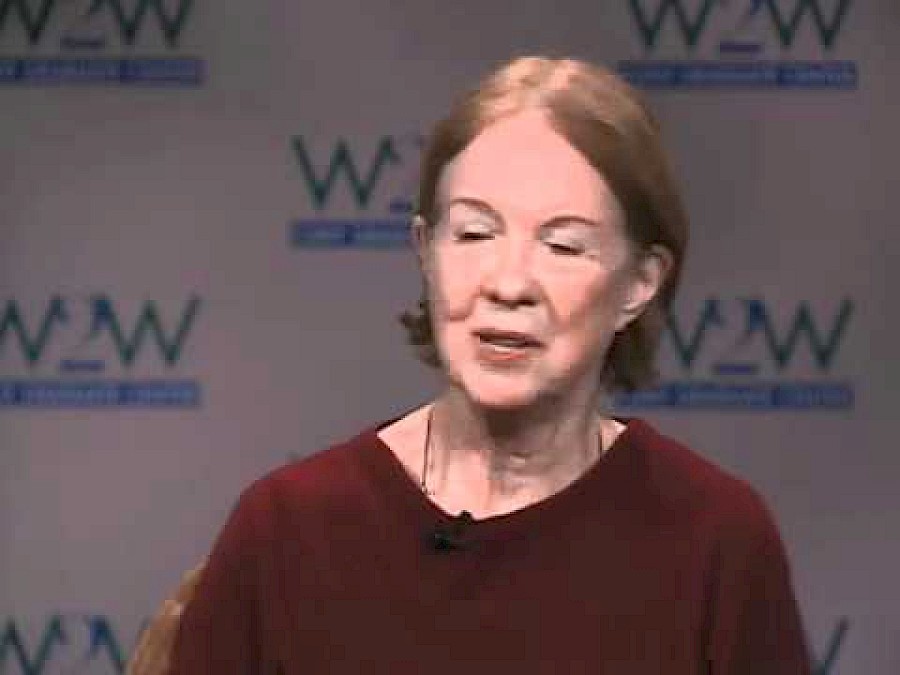"A prodigy" "...a poet..." "the James Dean of the classical piano world." Despite the overblown rhetoric that surrounded the young pianist William Kapell, his gifts were extraordinary by even the most clear-eyed assessments. He played Aaron Copland's music often and with conviction—whether or not listeners with more conventional tastes approved. When Kapell died in a tragic plane crash in 1953 at age 31, Copland lost a friend and an important advocate for his music.

Autumn brings Kapell-related anniversaries. This year marked the 100th anniversary of Kapell's birth (Sept 20). Next year is the 70th anniversary of his death (Oct. 29). And sixty-five years ago on October 25, Juilliard hosted the premiere of the substantial, long-awaited Piano Fantasy, which Copland dedicated to Kapell's memory.
Kapell was born September 20, 1922 in Manhattan, where his parents owned a bookstore on Lexington Avenue. He started winning major piano competitions at age 17. Before he turned twenty, a high-profile performance of the Khachaturian Piano Concerto with the New York Philharmonic at Lewisohn Stadium in the Bronx launched his professional career. He quickly made a name as a passionate interpreter not only of the most technically difficult literature, but of masterworks and new, modern repertoire as well.
Copland and Kapell crossed paths at Tanglewood in the early 1940s, when Copland's Piano Sonata would have been quite new, and Kapell was barely 20. Though very different in personality and 22 years apart in age, they shared much: both were raised in New York City by Jewish American parents from Eastern Europe; both were the first in their families to become musicians; both were drawn to modernist American piano music.

Kapell discovered the Copland Piano Sonata early. In January 1946, he wrote to Copland that he was practicing the Sonata "again." "This towering work is the one truly great piano composition to come from our country," the 22-year-old Kapell gushed. He also confessed that it wasn’t quite ready for his upcoming Carnegie Hall performance. "This work needs exactly as much maturing and ripening and mellowing as a Chopin Sonata or a Beethoven Sonata," he explained. Copland responded, "I hope the piece is as good as you think it is—in which case it won't wither at all from having to wait a season for the bang-up performance that I look forward to hearing you give."
Within a couple of years, Copland was writing music specifically for Kapell: he began sketching a piano concerto for a Louisville Symphony Orchestra commission that later fell through, and in 1948 he wrote a short piano piece, “Muted and sensuous,” for Kapell, which became the third of the Four Piano Blues (1926-48).
In 1951 Kapell included the Copland Piano Sonata on a recital at New York’s Town Hall that was a turning point for the young pianist’s reputation. Critics praised Kapell's ability to convey the "essential style" of a wide range of composers, from the opening Bach D Major Partita through the Copland Sonata and Debussy's Children's Corner Suite. Even the typically virtuosic closing work, Liszt's Hungarian Rhapsody No. 11, was "musically elegant," wrote one critic.
Copland's Piano Sonata was the biggest revelation to critics that night. Its second movement was "one of the high points of the recital," Miles Kastendieck wrote, for Kapell "achieved a balance and a sensitivity quite illuminating." Harold Schonberg called it "a big interpretation, one with power, drive and all the technique in the world...This listener has never heard a performance to match it." Arthur Berger was "overwhelmed" and "deeply moved" by the work's "brooding sentiments, as if a wasteland is being sadly contemplated."
At the same time, the reviews betrayed a latent hostility toward contemporary music among audiences and critics, which made Kapell’s commitment to Copland’s modernist, American works all the more noteworthy. Two critics pointedly credited Kapell, not Copland, with the work's affective impact. According to Kastendieck, Copland's sonata "gained substance” in Kapell’s hands; Schonberg complimented the pianist for being "unbothered" by the sonata's "awkward leaps" and, in the unabridged version of the review, grouched "it is not Mr. Kapell's fault if time has stripped off most of what little meat originally covered the music's bones." But Berger, a composer and longtime friend of Copland, praised the composition: "It is a massive, inspired achievement of our time,” he wrote, that fully deserved its prominent place on the program.
From that point forward, Kapell programmed the Piano Sonata with increasing frequency. In 1953 he played it at the Frick Collection in New York; the live recording, broadcast over WNYC-FM, is his only known recording of any of Copland's music. However, Kapell included the work on many of the 37 concerts he played during his final, three-month Australian tour.
Tragically, Kapell's return flight from Sydney crashed in the mountains near San Francisco on October 29, 1953, killing all nineteen people on board. Kapell left behind his 26-year-old wife, Anna Lou, and two young children. Copland wrote Anna Lou a long, heartfelt letter of condolence, which was published soon after in the Saturday Review.
Anna Lou Kapell worked closely with her husband's friends and associates to keep his art before the public after his death. She encouraged the publication of his diaries and the release of his live and studio recordings over the years. She remarried, raised six children, and returned to school, earning a doctoral degree in sociology. As a noted urban anthropologist, she was recognized for studies that prompted important reforms in the City of New York’s assistance programs for unhoused and impoverished people.
William Kapell’s legacy continues in part through her dedication. From 1986 into the twenty-first century, the William Kapell Competition brought rising stars to the Washington, DC area. Today, the International Piano Archives at Maryland (IPAM) holds his papers. A book by critic Tim Page, compiled from those documents, remains the best biographical source on Kapell.
In 1998/1999 RCA and BMG released The William Kapell Edition, a boxed set of nine CDs produced by Jon M. Samuels. It contains all recordings of Kapell’s playing that were known at the time, including his previously released commercial recordings, many live recordings that had never before been issued, a radio interview, and other material. Not long after, recordings made by an amateur audiophile during Kapell's final tour surfaced; Sony BMG Masterworks released them in 2008 as "Kapell Rediscovered: The Australian Broadcasts."
The Piano Fantasy is perhaps the strongest, most concrete testament to the Copland-Kapell connection. In his Saturday Review tribute, Copland had announced his intention to write a major solo piano work in Kapell's memory. It took four long, difficult years for Copland to finish it; he missed many deadlines. Widely regarded as one of Copland's most monumental—and yet most personal—compositions, the Piano Fantasy is a single, rhapsodic movement more than 30 minutes in length. William Masselos premiered it at a special concert at the Juilliard School, where Kapell had studied and later accepted a teaching position just prior to his death.
The emotions expressed in the Piano Fantasy are powerful and often unsettling. Most of the work’s harmonies and motives come not from a traditional, seven-note major or minor scale, but from a “tone row” of ten pitches, which Copland constructed as a resource, he said, to help him write something completely new. He explained in his memoirs, “I was well aware that I had become typecast as a purveyor of Americana in music. I knew this was not the whole story, or even the best of the story.”

Indeed, many have remarked that the Fantasy sounds unlike any other Copland composition. One can only imagine the virtuosic, choleric Kapell pounding out the Fantasy's dissonant chords from the top of the keyboard to the bottom, and then, in quieter moments, transporting the listener into a shimmering "wasteland" akin to the one Berger had heard in the 1951 Town Hall performance of the Piano Sonata.
When the Fantasy was completed, Kapell’s widow, then Anna Lou Dehavenon, sent Copland a warm note of thanks: "Willy would have been deeply moved and excited to carry your new Piano Fantasy about the world. It is a great privilege of which he was deprived. I was profoundly touched that you should have remembered him in this way. Thank You.” (Complete Copland p263)
Further Reading
- Copland, Aaron. “The Measure of Kapell” Saturday Review, November 28, 1953, p.67.
- Copland, Aaron and Vivian Perlis. The Complete Copland. New York: Pendragon Press, 2013, pp. 263.
- Kapell, William. The Australian Broadcasts reDiscovered. RCA Red Seal, 2008.
- Kapell, William. William Kapell Edition. RCA Red Seal, 1998/1999.
- Page, Tim. “William Kapell’s Piano Benchmark” The Washington Post; Washington, D.C. September 27, 1998, G01.
- Page, Tim. William Kapell: a documentary life history of the American pianist. College Park: International Piano Archives at the University of Maryland, 1992.




